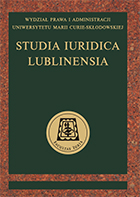Pierwsza nowelizacja rozporządzenia Prezydenta RP z dnia 6 lutego 1928 r. – prawo o ustroju sądów powszechnych w debacie sejmowej w 1928 r. Wybrane zagadnienia
The First Amendment to the President’s Ordinance of 6 Feb. 1928. The Statute on the Structure of Common Courts of Law as a Subject of the Sejm Debate in 1928. Selected Problem
Author(s): Dorota MalecSubject(s): History of Law, Constitutional Law, Public Administration, Politics and law, Interwar Period (1920 - 1939)
Published by: Wydawnictwo Naukowe Uniwersytetu Marii Curie-Sklodowskiej
Keywords: administration of justice; Statute on the Structure of Common Courts of Law; law codification; Sejm of the second term of office; Second Republic of Poland; inter-war Poland;
Summary/Abstract: The first all-Poland Statute on the Structure of the Common Courts of Law was initially being elaborated in the Second Republic’s Codification Commission but eventually it assumed a final form of Ordinance issued by the Republic’s President on 6 Feb. 1928. The Ordinance was equipped with the force of law. When compared with the provisions of the March Constitution of 1921, the regulations of the Ordinance diminished in particular the scope of the principle of irremovability of judges from their office. This gave rise to the dissatisfaction of the milieu of lawyers, and particularly the judges. The works on the amendment to the Ordinance were started prior to the Ordinance coming into force, and namely they started when there were filed with the Sejm the amendment projects drafted by the clubs of deputes, and specifically inter alia by the Parliamentary Association of Polish Socialists, by the National Club, by the Polish Peasant Party “Liberation” and the Party of Peasants. Also the Ministry of Justice emphasized the need for amending the Ordinance. In view of the fact that the calendar of Sejm debates did not foster the work of the Juristical Commission (the Sejm session being adjourned in June 1928), the National Club decided, in November 1928, to file the Bill on the postponing (by one year) the coming into force of the enactment of common courts of law structure. In the Sejm, the Bill was subjected to the debate during three sessions and eventually the lower house passed the law on the postponing (until 30 January 1930) the coming into force of the new provisions. However, this enactment failed to come under consideration of the Republic’s Senate. As a result, despite the alleged victory of the Sejm in its struggle with the executive power, the Ministry of Justice implemented its own image of the new organization of the administration of justice and, while exploiting the temporary suspension of the principle of irremovability of judges, got rid of those of them whose views did not comply with the political line promoted by the Sanation (Sanacja) Camp. Among those who were dismissed there was the First President of the Supreme Court W. Seyda and other Supreme Court judge A. Mogilnicki, known for his critical attitude toward the new provisions. The dismissal of W. Seyda caused a considerable critical reaction of the public and even induced the National Democratic Party members to try to pass the vote-of no confidence vis-à-vis Minister of Justice S. Car who was responsible for the introduction of the 6 Feb. 1928 Ordinance and for making staff changes in the judicature. In February 1929, the question of amendment was again subjected to the debate of the parliament which finally adopted, on 4 March 1929, the Statute that liberalized a series of contested principles. Yet despite this, the hopes for further changes in the system of administration of justice were shattered by next alterations that were introduced, and particularly those of August 1932, which laid out the tendency to further interfering by the Ministry with the independence of judiciary. It was, inter alia, W. Makowski who, during the December debate on the administration of justice, expressed his criticism to the principle of the separation of powers and the concept of preserving balance between them. These last ideas were reflected in the ever more energetic works that tended toward the drafting of a new Constitution. When the latter was in fact adopted, it rejected the principle of separation and the balancing of powers.
Journal: Studia Iuridica Lublinensia
- Issue Year: 25/2016
- Issue No: 3
- Page Range: 599-616
- Page Count: 18
- Language: Polish

